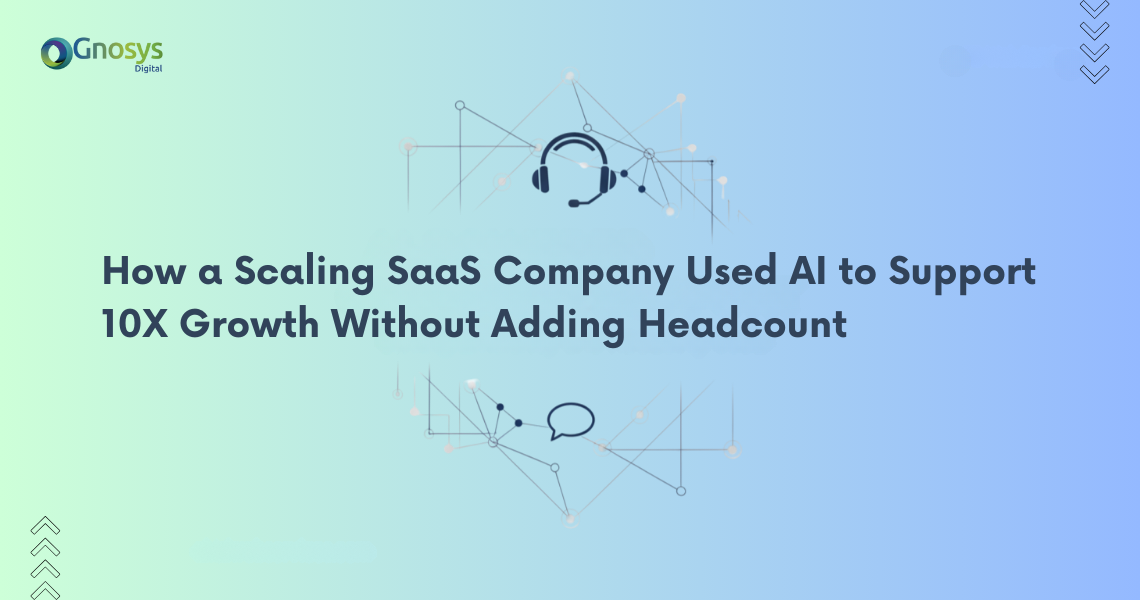Overview
Rapid growth is every SaaS company’s goal, but it can quickly place significant strain on operations. One fast-growing SaaS provider experienced a dramatic surge in customer support demand, with monthly ticket volumes increasing from 8,000 to over 80,000, while the support team remained limited to 15 agents. Response times extended beyond 48 hours, customer satisfaction began to decline, and the risk of churn increased.
Scaling the team through additional hiring would have been costly, time-consuming, and unsustainable. Instead, the company adopted an AI-powered customer support strategy to augment its existing workforce. This approach enabled the business to scale support operations intelligently, achieving 10X growth without increasing headcount. Within months, repetitive inquiries were resolved instantly, agents focused on high-value customer interactions, and customer support evolved from an operational bottleneck into a strategic driver of retention and revenue.
The Business Challenges
The support queue had become a persistent operational strain. During peak growth periods, customers routinely waited over 48 hours for responses, while support agents managed up to 200 repetitive tickets per day, including password resets, billing clarifications, and onboarding-related questions.
As ticket volumes increased, several critical challenges emerged:
- Slow response times: Average first response times exceeded 48 hours during demand surges, negatively impacting customer experience.
- Manual ticket triage and routing: Support agents spent nearly 60% of their time sorting, categorizing, and assigning tickets rather than resolving issues.
- High agent workload and declining morale: Repetitive tasks dominated daily workflows, increasing fatigue and raising the risk of staff turnover.
- Rising support costs: Maintaining acceptable service levels required continual headcount expansion, placing pressure on operating margins.
- Early signs of increased customer churn: Delayed resolutions led to growing customer frustration and an uptick in cancellation requests.
Customer support was no longer enabling growth—it had become a critical bottleneck threatening customer satisfaction, retention, and long-term revenue.
Solution Overview: The Transformation Experience
Instead of deploying AI as a replacement for human agents, the strategy focused on augmenting the support team with intelligent automation.
The Transformation: Before vs After AI
| Area | Before AI | After AI |
|---|---|---|
| Response Time | 24–48 hours | Instant for common issues |
| Ticket Handling | Linear growth with headcount | Scales without added headcount |
| Common Queries | Repetitive work for agents | 60%handled instantly by AI |
| Complex Issues | Backlogged in the queue | Routed with context & sentiment |
| Customer Experience | Slow, inconsistent | Fast, personalized, proactive |
| Churn Risk | Detected too late | Flagged proactively |
| Support Costs | Increased with growth | Flattened despite 10X traffic |
| Revenue Impact | N/A | AI identifies upsell/expansion opportunities |
Support shifted from reactive firefighting to proactive, intelligent assistance.
Technology Stack
- AI-Powered Conversational Chatbot: Automatically resolves high-volume, repetitive customer queries, significantly reducing response times and allowing agents to focus on complex, high-value interactions.
- Natural Language Processing (NLP): Interprets customer intent and conversational context to deliver accurate automated responses and enable intelligent ticket classification and routing.
- Sentiment Analysis Engine: Monitors customer tone and emotional signals in real time to identify frustrated or at-risk users, enabling proactive support interventions before churn occurs.
- CRM & Ticketing System Integration: Seamlessly connects AI insights with existing support workflows, providing agents with full customer history and contextual visibility.
- Analytics & Reporting Dashboard: Tracks AI performance, resolution times, ticket trends, and customer satisfaction metrics to support data-driven optimization and continuous improvement.

Results & Business Impact
Within six months of AI implementation, the company achieved measurable improvements across operational efficiency, cost control, and customer experience.
Impact Highlights
🚀 10X Traffic Growth: Successfully handled ten times the support request volume without increasing support headcount.
📱 5X Mobile Support Interactions: Enabled seamless, always-on support for customers across mobile channels.
📉 Reduced Customer Churn: AI-driven sentiment analysis and faster resolution helped reduce churn from 6% to 3%.
💰 Lower Support Operating Costs: Automation absorbed the equivalent workload of three full-time agents, generating approximately $180 in annual cost savings.
⭐ Higher CSAT Scores: Customer satisfaction increased from 78% to 92%, even as ticket volume surged.
Client Perspective
“The AI transformation didn’t just save us money, it fundamentally changed how we engage with customers. Support shifted from our biggest scaling challenge to a strategic advantage for the business.”
— Head of Customer Success, SaaS Client
💰 ROI Breakdown (12 Months)
| Category | Impact |
| Cost Savings | 3 FTE equivalents saved = $180K+ |
| Revenue Protection | Reduced churn = $250K+ retained |
| Upsell Identified | AI-detected opportunities = $75K+ |
| Efficiency Gain | 60% time saved for strategic work |
🔑 The Most Telling Number
60% of repetitive customer queries are now handled instantly by AI, freeing agents to focus on the 40% of conversations that build loyalty, trust, and revenue.
🧠 Key Lessons for Other SaaS Companies
- Start with high-volume, low-complexity queries to achieve quick wins
- Measure adoption, not just automation rates
- Position AI as an assistant, not a replacement
- Budget for change management (approximately 30% of project effort)
Conclusion & Future Roadmap
This project repositioned customer support from a reactive cost center into a strategic growth lever. By automating operational efficiency with AI, the company unlocked capacity for innovation, proactive engagement, and deeper, more meaningful customer relationships. Support teams were able to move beyond ticket resolution and contribute directly to retention, satisfaction, and long-term value creation.
Future roadmap initiatives include:
- Predictive support: Anticipating customer issues before they surface to reduce friction and support volume.
- Proactive outreach: Engaging at-risk customers early to prevent churn and uncover upsell opportunities.
- Advanced AI-driven insights: Leveraging support conversations to inform product decisions, customer success strategies, and go-to-market planning.
- Continuous optimization: Refining AI performance through ongoing analysis of resolution rates, adoption trends, and emerging customer needs.
Together, these initiatives ensure customer support continues to scale intelligently, driving operational excellence, customer loyalty, and sustainable revenue growth.

